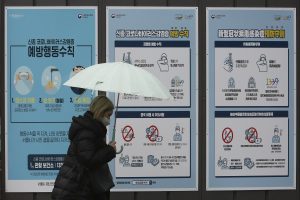Despite its close proximity to China, South Korea, following its painful experiences with the SARS and MERS outbreaks, has been distinctly prepared for coping with a virus pandemic. With an efficient bureaucracy and state of the art technology, South Korea had been able to contain the novel coronavirus (COVID-19) to just 30 patients until February 17. Extensive preparations from as early as November 2019 and proactive policies led to President Moon Jae-In’s premature declaration in mid-February that “the situation will almost disappear.”
Flash forward three weeks and South Korea has more than 7,000 confirmed infections and 50 deaths, the largest outbreak outside of China, with the exception of Italy. The southeastern city of Daegu, the epicenter of the outbreak in South Korea, has been likened to the new Wuhan and over 91 countries have either banned or restricted entry of Koreans.
With everything seeming so positive just weeks before, how did the situation get so bad? Cults and conservative politicians are at the center of it all.
Korea’s confidence in containing COVID-19 came crashing down with the discovery of patient 31, a member of a fringe Christian sect known as the Sincheonji Church of Jesus. The group has multiple outposts in China, including Wuhan, where it is believed several members caught the virus. Despite warnings to self-isolate after a high fever and flu-like symptoms in the city of Daegu, the unnamed woman visited multiple large-scale church gatherings, where she spread the virus to hundreds of other churchgoers. As a result, only days after her diagnosis the number of confirmed cases skyrocketed to more than a thousand, prompting the government to declare a public health emergency. Unlike other Christian sects, Sincheonji (meaning new heaven and Earth) believe its Church’s founder, Lee Man-hee, is the second coming of Jesus Christ and has been chosen to lead 144,000 people into the afterlife. Members of the group were told to refrain from wearing face masks as their belief in Lee and God would shield them from the virus, in some cases they were told to endure disease and attend church services.
Since the outbreak, the sect has actively stifled government requests for transparency, providing false lists of church members and encouraging members to hide from authorities. The churches involvement in the outbreak has provoked palpable public rage, yet it has also revealed the deep reach of cults and fringe church groups in politics and society. This was made clear after the health official designated to lead the containment effort in Daegu was exposed to be a member of the church himself. After repeated denials, the official was forced to reveal his church membership after testing positive to the virus – 50 members of his staff were placed in quarantine shortly after. Not only are senior officials connected to the clandestine church but also an alleged network of Korean celebrities, models and tv personalities.
However, the presence of cults is not a new phenomenon. In 2016, then-President Park Geun-hye was impeached for syphoning millions of dollars in bribes and disclosing state secrets to her spiritual advisor Choi Sun Sil. Choi was deeply connected to a shadowy religious sect known as The Church of Eternal Life. Furthermore, the tragic sinking of the Sewol Ferry in 2014, where more than 300 Korean school students drowned at sea on a field trip has also been attributed, in part, to the influence of clandestine cults. Korea’s brutal transition from a third world country to first world power created distinct conditions for cults to thrive. Autocratic Korean regimes of the past were hesitant to crack down on any form of religious groups for fear of public backlash; helping rights groups and unions to find sanctuary under the umbrella of pseudo-religious protection. This created an environment where religious fringe groups have been allowed to proliferate with little government oversight.
While cults can be attributed to the spread of COVID-19, the cynical tactics of conservative politicians can be blamed for stifling the government’s containment policies. Still recovering from the dramatic downfall of their leader, Park Geun-hye, conservatives have desperately waited for an opportunity to exploit a breach in the liberal government’s armor. Conservative politicians have been relentless in criticizing Moon for not imposing a blanket travel-ban on Chinese visitors, a decision which would have had devastating impacts for a country so reliant on Chinese commerce. Conservative populists also ignored government warnings against large scale congregations and continued to hold rallies in Seoul. The conservative firebrand, Jun Kwang-hun, falsely mislead his followers – most of which are elderly and susceptible to infection — that the coronavirus outbreak was impossible to contract outdoors.
Less radical conservatives in the national assembly have also offered nothing but vitriol against Moon’s administration. The conservative United Party has adopted an all-out pressure campaign for the president to publicly apologize for the spread of COVID-19, in spite of the outbreak occurring largely out of government control. Even the former President Park, from behind bars, has called for conservative political supporters to rally against the current administration. This can all be seen as a cynical attempt to drum up support for upcoming parliamentary elections in April.
Ultimately, the coronavirus has painfully brought to light the reach of clandestine cults in Korea for the world to see. This should prompt the government to enact long overdue reforms to monitor the behavior of fringe groups and religious sects. Yet it has also exposed the cruel cynicism of the political establishment in politicizing an unprecedented health crisis. In order for South Korea to win its war on COVID-19, one can only hope that both sides of politics finally place the greater good above their personal ambitions – yet that seems highly unlikely.
Christopher Khatouki is a Councillor at the Australian Institute of International Affairs. He is a guest teacher for the Gyeongsangnam-do Office of Education in South Korea.

































